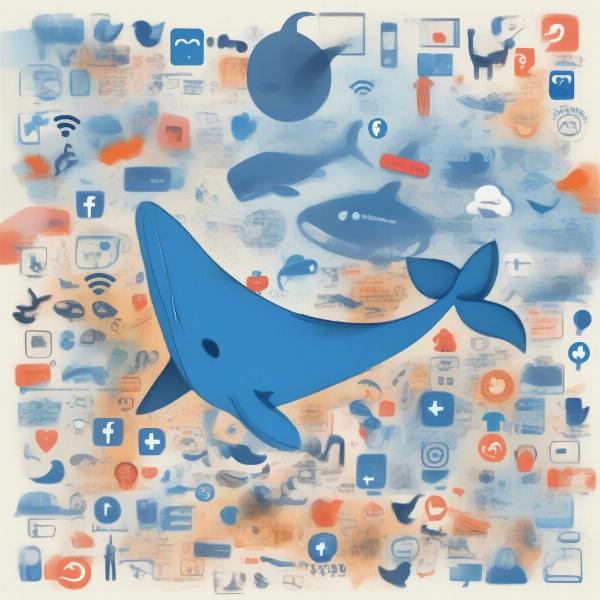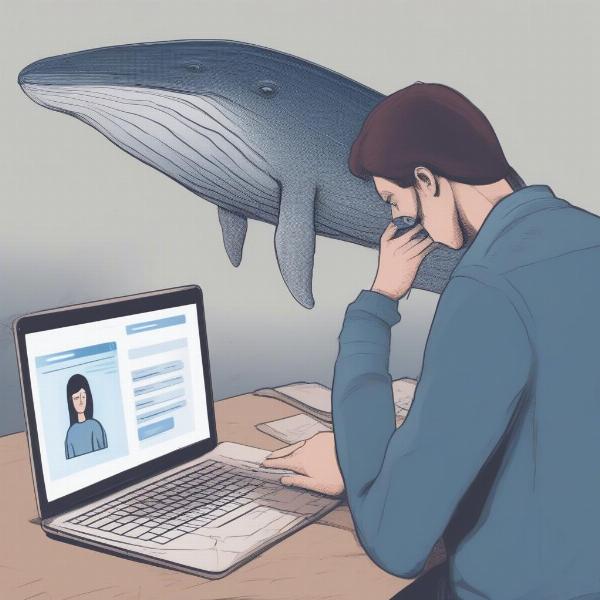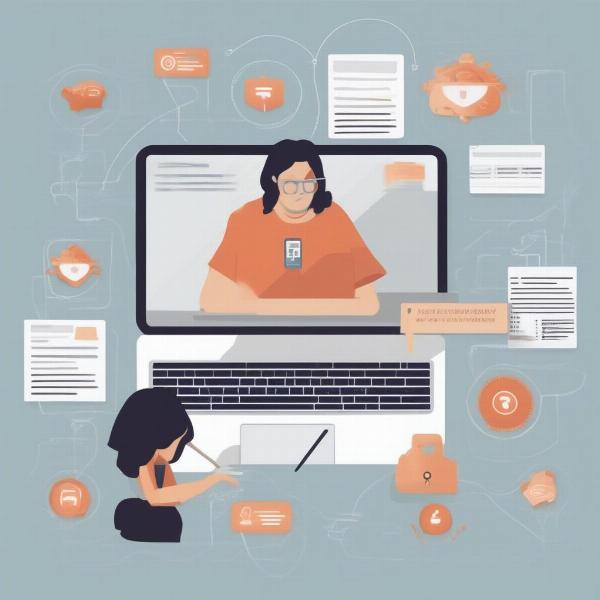The phrase “How Do You Play The Blue Whale Game” often arises from morbid curiosity about this dangerous online challenge. This article delves into the unsettling reality of the Blue Whale Challenge, its origins, and why it’s crucial to avoid any involvement.
Decoding the Blue Whale Challenge: What It Really Is
The Blue Whale Challenge isn’t a game in the traditional sense. It’s a series of self-harm tasks assigned by an “administrator” over 50 days, culminating in the participant’s suicide. These tasks escalate in severity, ranging from sleep deprivation and watching disturbing videos to self-mutilation. The so-called “game” preys on vulnerable individuals, often teenagers, manipulating them into completing these harmful acts. It’s essential to understand that this isn’t entertainment; it’s a dangerous form of online manipulation with potentially fatal consequences.
The Origins and Spread of the Blue Whale Challenge
The Blue Whale Challenge first gained notoriety in Russia around 2015, linked to a social media group called “F57.” While the initial reports were sensationalized and some aspects remain shrouded in uncertainty, the challenge’s potential for harm is undeniable. It spread through social media platforms, leveraging hashtags and closed groups to recruit participants. The anonymity of the internet allowed administrators to operate with relative impunity, making it challenging to track and stop the spread of the challenge.
 Blue Whale Challenge Social Media Spread
Blue Whale Challenge Social Media Spread
Why You Should Never Participate in the Blue Whale Challenge
Participating in the Blue Whale Challenge poses a severe risk to your physical and mental well-being. The tasks are designed to be emotionally and psychologically damaging, leading to feelings of isolation, hopelessness, and ultimately, suicidal ideation. The manipulative nature of the challenge makes it incredibly difficult for individuals to break free once they’ve started.
The Dangers of Online Manipulation
The Blue Whale Challenge highlights the dangers of online manipulation, particularly among young people. Administrators exploit vulnerabilities, offering a sense of belonging and purpose to individuals who may be struggling with depression, anxiety, or social isolation. This manipulative tactic makes it difficult for participants to recognize the danger they’re in and seek help.
“The anonymity offered by online platforms can embolden those with malicious intent,” says Dr. Anya Sharma, a leading expert in cyberpsychology. “It allows them to create a false sense of intimacy and trust, making it easier to manipulate vulnerable individuals.”
What to Do If You Encounter the Blue Whale Challenge
If you encounter the Blue Whale Challenge online, it’s crucial to avoid interacting with it. Don’t click on links, don’t participate in discussions, and report any suspicious activity to the platform’s administrators. If you know someone who may be involved, reach out to them and encourage them to seek help.
 Reporting the Blue Whale Challenge Online
Reporting the Blue Whale Challenge Online
Seeking Help and Support
If you or someone you know needs help, numerous resources are available. Contact a crisis hotline, mental health professional, or trusted adult. Remember, you’re not alone, and help is available.
Resources for Mental Health Support
- The National Suicide Prevention Lifeline: 988
- The Crisis Text Line: Text HOME to 741741
Beyond the Blue Whale: Recognizing Online Dangers
While the Blue Whale Challenge gained widespread attention, it’s crucial to recognize that other forms of online manipulation and harmful challenges exist. Staying informed about online safety and being cautious about online interactions is vital.
 Online Safety Awareness
Online Safety Awareness
Protecting Yourself and Others
Educate yourself and others about the dangers of online manipulation and harmful challenges. Encourage open communication and create a supportive environment where individuals feel comfortable seeking help if they need it.
“Open communication is key to preventing online harm,” adds Dr. Sharma. “Creating a safe space for young people to discuss their online experiences without fear of judgment can make a significant difference.”
Conclusion: Staying Safe in the Digital World
Understanding the dangers of the Blue Whale Challenge and other online threats is essential for navigating the digital world safely. By staying informed, being cautious, and seeking help when needed, we can protect ourselves and others from the harmful effects of online manipulation. Remember, the question “how do you play the Blue Whale game” should be answered with awareness, not participation.
FAQ
- Is the Blue Whale Challenge a real game? No, it’s a dangerous form of online manipulation disguised as a game.
- How does the Blue Whale Challenge work? Participants are given a series of increasingly harmful tasks over 50 days, leading to self-harm and suicide.
- Who is most vulnerable to the Blue Whale Challenge? Teenagers and young adults struggling with mental health issues are particularly vulnerable.
- What should I do if I see someone promoting the Blue Whale Challenge? Report it to the platform’s administrators and encourage anyone involved to seek help.
- Where can I find help for someone involved in the Blue Whale Challenge? Contact a crisis hotline, mental health professional, or trusted adult. The National Suicide Prevention Lifeline (988) and the Crisis Text Line (Text HOME to 741741) are excellent resources.
- Are there other online challenges like the Blue Whale Challenge? Yes, various forms of online manipulation and harmful challenges exist. Staying informed and cautious is essential.
- How can I protect myself from online manipulation? Be mindful of online interactions, avoid engaging with suspicious content, and report any harmful activity.

